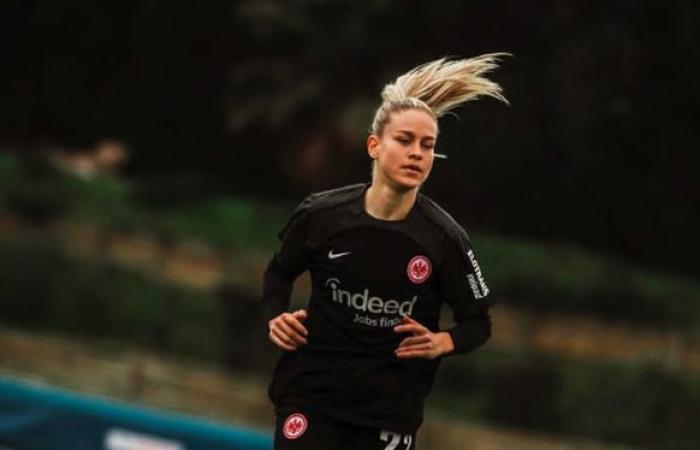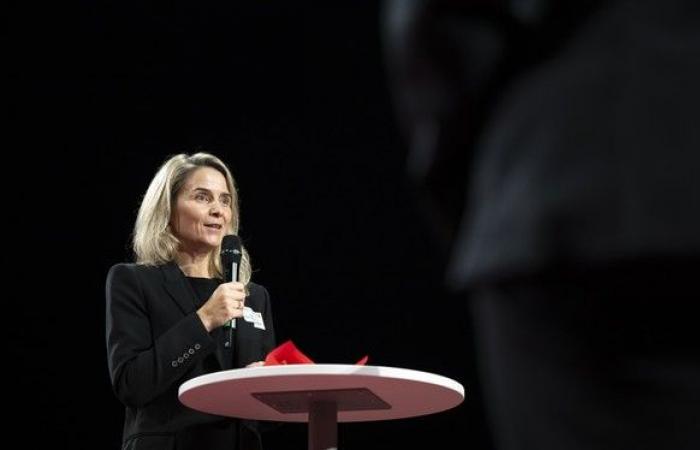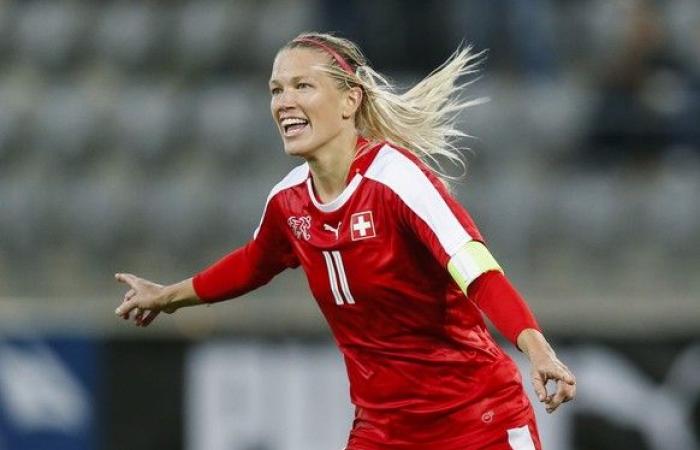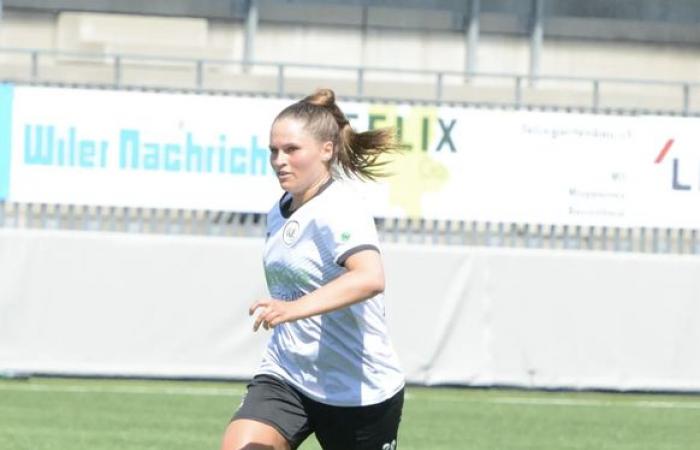There are still few pros in the Women’s Super League, in which Young Boys and Servette Chênois play.Image: keystone
In six months the Women’s Euro will take place in our country. The opportunity to take stock of the discipline. With a number: 20, the number of footballers in the Swiss elite who can currently make a living solely from their sport.
Raphael Gutzwiller / ch media
When Nadine Riesen played for the first time in the highest Swiss league in 2015, the world of Football was still different. She washes her training equipment at FC St. Gallen herself, buys her shoes with her pocket money and receives no salary.
When, two years later, she made her debut with Young Boys, she was surprised to receive a small salary for the first time. “Until then, money played absolutely no role in football for me. I did it simply because it made me happy. I almost couldn’t believe that there was something in return,” recalls the 24-year-old from Appenzell. Today, she is a Swiss international and professional player for Eintracht Frankfurt in the German Bundesliga.
In six months, the Nati will start the Euro at home. Nadine Riesen is convinced of this:
“This tournament will trigger a lot of things in Swiss football. And we, the players of the national team, know that we can contribute largely through our performances.
Nadine Riesen currently plays for Eintracht Frankfurt. image: instagram
Fans and a championship development
When we speak with players in women’s football, we often hear that a lot has changed in recent years. But also that the end of the tunnel is far from being reached.
Marion Daube is one of the women who helped move things forward in Switzerland. In 2009, she joined FFC Seebach as director, merged this club with FC Zurich, built a team which became national champions several times and which was a model for other Swiss clubs.
In the meantime, Marion Daube became director of women’s football at the Swiss Football Association (ASF) and, thanks to a successful bid, managed to bring Euro 2025 to Switzerland. She makes this observation:
“We are not yet where we want to be, but we are on the right track”
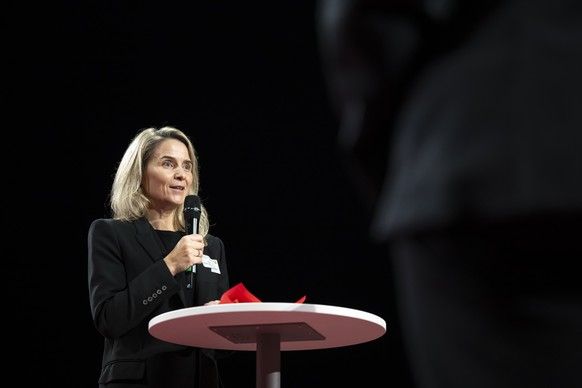
Marion Daube is director of women’s football at the Swiss Football Association (ASF).Image: keystone
When the Swiss national team plays, fans flock to the stadiums. More than 17,000 fans were present at the stadium during the home match against Germany at the end of November. This is a record for a women’s international meeting in Switzerland. This year, this record will certainly be broken again. The objective is for all Euro matches to be played to a sold-out crowd.
“We notice that certain things have changed in public perception,” observes Nadine Riesen. Today, when she walks in St. Gallen, the Appenzeller is often recognized.
“That wasn’t the case at all before. But people are following us now. It’s nice”
Of course, the Nati occupies first place in the public’s mind when it comes to women’s football, but the Swiss championship has also undergone changes, notes Marion Daube: “It has become attractive for partners, spectators and sponsors. In 2021, the National League A became the Women’s Super League, and it now has a title sponsor. Many teams now play regularly in large stadiums.
A minority of professionals
In Switzerland, it is mainly former players who have been on the front line for the development of women’s football. Several ex-members of the national team held management positions in clubs after their career: Lara Dickenmann at GC, Patricia Willi at St. Gallen, Sandra Betschart at YB women, Gaëlle Thalmann at Lugano or Sandy Maendly at Servette.
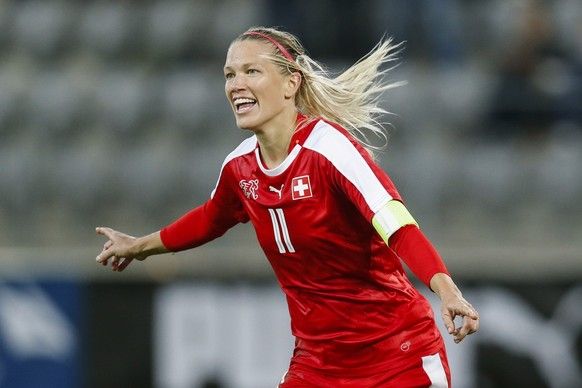
Lara Dickenmann served as GC’s sports director.Image: KEYSTONE
But many have already left their positions in the meantime. Marion Daube knows that it is not always easy to evolve in this sport dominated by men:
“It’s not easy as a woman to make things happen in this sporting culture. It takes a lot of perseverance”
Since the arrival of the title sponsor in the national championship, it has undergone a new format: a play-off system. But this mode still sparks debate. In 2022, for example, the final ended in a penalty shootout. The Servettians, beaten by FC Zurich, had to play numerically inferior for almost an hour, after an expulsion.
Enough to reduce the efforts of an entire season to nothing. This is why the final now takes place in a double round-trip confrontation. “It’s more equitable,” applauds Marion Daube.

Servette is the reigning Women’s Super League champion.Image: keystone
The Swiss league has certainly become professionalized, but only a minority of female footballers manage to make a living from their sport in our country. This is what the Women’s Super League figures show.
Less than half of the players receive more than the 500 francs maximum monthly fee allowed for amateur players.
Where do you think that in the national championship, only 20 players can make a living from football. “It’s a good thing that we have more and more female footballers who are no longer pure amateurs. But we are operating here at a low level,” notes Marion Daube.
“The difference between the national team players who play in Switzerland and those who play abroad is still far too great from a financial point of view.”
To become professional, many Swiss footballers still go abroad. Nadine Riesen has also taken this step. After the 2023 World Cup, she joined Frankfurt in the Bundesliga. “I was tempted to take a step forward athletically, to stay motivated in a better league and to work more on myself,” she explains. But of course, money also played a role.
“In Frankfurt I can now be professional, which was not possible before. But there are certainly also female footballers in Switzerland who earn about as much as me. But in Germany, life is a little cheaper, which is why it is easier to make a living from football.”
In the German club, the training conditions are also better than those to which Nadine Riesen was accustomed in Swiss clubs.
Swiss juniors crossed out by foreigners
Sometimes the comparison with men’s football is harsh, laments Nadine Riesen:
“Of course, I know things are no better in other sports than at home. But we always have the comparison with men’s football. It’s the same sport, only the gender is different. This is why we are aware of everything that would still be possible.”
For Appenzell, this was particularly obvious among young people. While the boys were already supervised professionally from the age of 15, Nadine Riesen moved directly, at the age of 15, from the junior girls C of FC Bühler to the first team of FC St. Gallen. In other words: she did not receive any real training. “I hope that today, clubs invest better in their own emerging players and that they are better encouraged,” she confides.
According to the Nati defender, equal treatment between boys and girls is more advanced in Germany.
Marion Daube also affirms that promoting the next generation is essential. Recently, the director of women’s football at the ASF noticed a problem in this regard: in our championship, more and more foreign female footballers are being recruited by clubs. “Our clubs should be encouraged to promote their own juniors,” proclaims Daube.
The same problem exists in Swiss men’s football????
Details revealing
Jennifer Wyss (21) is also committed to the development of women’s football. She played in the Super League with FC St. Gallen and FC Lucerne. The midfielder now wears the jersey of FC Wil, in National League B. At the same time, she works full-time for the Football Association of Eastern Switzerland (OFV). She is responsible for the implementation of sustainable development projects for grassroots football. “This European Championship is a huge chance to develop women’s football,” she enthuses.

Jennifer Wyss played in the Super League and now plays for FC Wil.Image: Beat Lanzendorfe
For example, the OFV now offers courses reserved for female coaches. The association’s official objective is to double the number of players by 2027, but also the number of coaches, referees and civil servants.
“The number of female players will increase with the Euros and the increased attention, which is why it is important that there are also more women in other functions. If suddenly a lot more girls want to play football, we have to be ready.”
Jennifer Wyss.
The Saint-Galloise also works as an assistant coach for the under-14 girls at FC Wil and sees a difference with the time when she was a junior: “I always played with boys and, at 15, I directly joined the Super League team. I immediately had a starting place,” remembers Jennifer Wyss, before continuing:
“Today, the path is much longer for most players. The level is increasing and it is no longer so easy to access the first division.
Until recently, FC Wil players even had to pay a membership fee, but after integration into the SA, this “contribution” was abolished. Their training clothes are washed and they can use the men’s team’s gym. “These all seem like small details, but for us, these are important things and we are extremely grateful,” applauds Jennifer Wyss.
The protagonists of Swiss women’s football are convinced that the Euro will give a big boost to their field, that attention to it will increase. Marion Daube concludes:
“Men’s football also needed time to develop. We are now in the middle of this process”
Yes, even though it still has a long way to go, Swiss women’s football is on the rise.
Translation and adaptation into French: Yoann Graber
More sports articles
Show all articles


